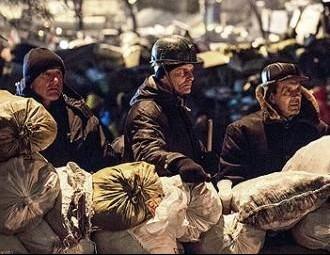Andrei Yahorau: Paramilitary troops from without will only harm Maidan
 photo by kommersant.ru
photo by kommersant.ru
The Director of Centre for European Transformation disapproved of the idea to form “international subdivisions”. He believes that abolishment of draconian laws won’t make Maidan dissolve.
Uladzimir Baradach, ex-commander of Belarusan riot police and political émigré, voiced his plans to form “international subdivisions” for Maidan’s protection. On behalf of the National Revival Council he called for the military experts from the neighboring countries to unite, so that to help the protesters in Ukraine.
EuroBelarus Information Service discussed the expedience of such troops and Ukrainian situation after the repeal of the anti-demonstration laws with Andrei Yahorau, the Director of Centre for European Transformation.
- Is the formation of the “international subdivisions” at all possible and who will coordinate their work? Or is it just yet another resounding statement?
- To find people, who will respond to this call, a person should have indisputable authority, which Baradach doesn’t have at the moment. On a large scale, Ukrainians need some different help now; besides, such kind of troops will only help the opponents, who will blame the protest movement in Ukraine with external connections and so on. So we should rather focus on what Maidan really needs; and a number of websites write about it, for example, Euromaidan SOS and its group on Facebook. They do not need people; they need wide Media coverage, so that the world knows what is really going on in Ukraine. Besides, protesters need humanitarian aid. I believe that Baradach has sincere intentions and sympathizes with the Ukrainian people. However, his understanding is somewhat limited with his philosophy and worldview, so he calls for actions that can only harm Ukrainians.
- Are the authorities and opposition ready for peaceful dialog? And how will the situation be developing in the future?
- It is hard to make forecasts, as the situation has already changed several times. And each time its logic breaks because of the people’s thoughtless actions. Now the situation is in the hand of the protesters, and it is of great importance that they insist on pursuing their demands, appoint transitional government and so on. Protesters should grow their influence up to the point when their demands are fulfilled.
But to what extent opposition leaders are ready to take resolute stance and protect the demands of their people, to what extent they control Maidan forces and to what extent people at Maidan trust their leaders is an open question.
-
03.01
-
07.10
-
22.09
-
17.08
-
12.08
-
30.09








































